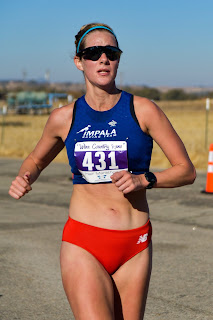Name: Tiana Abdulmassih
Age: 26
City/State: San Francisco, CA
Occupation: Account Executive at LinkedIn
Hobbies/interests outside of running:
Photography, painting, hiking, cooking
Photography, painting, hiking, cooking
When did you start chasing the OTQ and what inspired you to try?
I
started running with the dream of running a sub 2:45 in the summer
of 2018. I'm a dual-citizen of both the USA and Lebanon. For the USA, a
sub-2:45 time meant that I could run in the US Trials. For Lebanon,
running this time meant that I would qualify to run in the Olympics
themselves (before the IAAF changed the standard). I had joined the
Impala Racing Team (an Elite Development racing team) in San Francisco,
not thinking that something like this was within reach for me. Being
surrounded by fast, strong, and inspiring women who pushed me to be
better made me think that it was worth going for.
Tell us about the races you attempted to OTQ at and the outcomes.
I
was supposed to run CIM in 2018, but had to drop out a week before the
race due to a stress fracture. I trained hard and ran the Rotterdam
marathon in spring of 2019, but blew up after 10K. I finished the race around 3:30, but injured myself in the process. I
struggled with ITB for about 4 months after Rotterdam, not being able to
run at all. I wasn't recovered in time to run Chicago in the fall, as I
had originally planned, so I registered for Houston instead. I trained
for 18 weeks for Houston and had one of the best training blocks. The
Houston marathon was a dream - I ran representing Lebanon. I felt
incredible and ran with the sub 2:45 pack up until mile 20. At 20, I
started to feel nauseous so I backed off on the pace; I threw up a
couple miles later, and then continued on to finish in 2:55:58 - not the
time I trained for, but a time that I'm extremely proud of.
What did you gain from this journey?
I
learned so much about myself and my teammates through this two year
process. Juggling training with a full time job, while trying to also be
a social 26-year-old, is one of the hardest things I've ever done. The
support and encouragement I received from my teammates throughout was
indescribable - it's made me realize that we really can do anything we
put our minds to. I've also gained a deep respect for the marathon
itself.
What are you most proud of about your OTQ pursuit?
I'm
most proud of overcoming many injuries to be able to continue running
and pursuing this goal. I'm also most proud of the day-to-day effort
that I put in:
- The early, cold, mornings when I had to start running at 4:45 a.m. to get it done before work.
- The after work runs in the dark that I never felt like doing, but did anyways, with the promise of being able to eat dinner and hang with my boyfriend for a bit before going to sleep at 9 p.m.
- Then... waking up the next morning and doing it all over again.
Do you have any regrets or things you wish you’d done differently in your OTQ pursuit?
I'm
really happy to say that I don't have any regrets. I'm extremely
excited with the progress that I made as a runner, and person, over the
past couple of years. I know that faster times are in my future and I
feel fortunate to be able to continue chasing my goals.
What message would you like to send to those following your running pursuits?
I
want to say a big THANK YOU to my family, boyfriend, friends, coaches,
teammates, and colleagues for all of their support. I wouldn't be where I
am today without you all.
Tell us something unique about yourself.
I'm ambidextrous - this doesn't really help when it comes to running, unfortunately!
What’s next for you?
I've
taken some time off to recover and reflect. I'm excited to run some
shorter races this spring in anticipation for Grandma's marathon this
coming June, followed by the Berlin Marathon in the fall.




Do you know what the IAAF changed the standard to? Out of curiosity.
ReplyDelete2:29:30 - a huge change that means many smaller countries won't send any runners to the 2020 games.
DeleteWow, that's crazy!
Delete